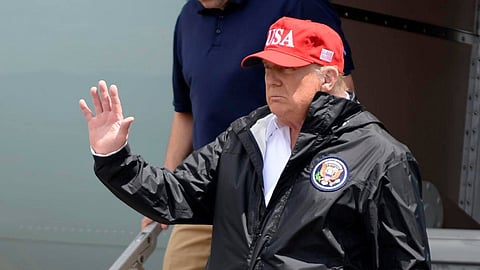

A Michigan judge has dismissed criminal charges against 15 Republicans accused of falsely certifying Donald Trump as the winner of the 2020 presidential election in the state, delivering a substantial setback to state prosecutors.
The ruling came during a court hearing where District Court Judge Kristen D. Simmons determined that the defendants lacked the intent to commit fraud.
Simmons emphasized that the individuals seriously believed there were issues with the election results and were exercising their constitutional right to seek redress.
The case stemmed from actions taken in December 2020, when the group met at the Michigan GOP headquarters and signed a document claiming to be the state's duly elected and qualified electors.
President Joe Biden had won Michigan by nearly 155,000 votes, a margin later confirmed by a Republican-led state Senate investigation in 2021.
Each of the 15 defendants had faced eight felony charges of forgery and conspiracy to commit election forgery, which carried potential penalties of up to 14 years in prison.
Outside the courtroom, supporters cheered the decision, with some defendants embracing family members in emotional displays of relief.
One of the accused, Meshawn Maddock, a prominent Michigan Republican and former co-chair of the state party, was among those cleared.
Her attorney described the prosecution as a waste of resources.
Michigan Attorney General Dana Nessel expressed disappointment with the outcome, calling it a very wrong decision and asserting that the group knowingly violated election procedures.
The dismissal follows over two years of legal proceedings since Nessel, a Democrat, first announced the charges.
Simmons, appointed by Democratic Governor Gretchen Whitmer, took nearly a year to evaluate the evidence after extensive preliminary hearings.
In her remarks, the judge clarified that the matter centered on the defendants' intent rather than the election's outcome itself.
She stated explicitly that this was not an election interference case.
One defendant had earlier agreed to cooperate with prosecutors, leading to dropped charges against him in October 2023, while the remaining 15 maintained their innocence throughout.
The ruling highlights challenges in similar prosecutions across other states where fake elector schemes were pursued.
In Nevada, Georgia, Wisconsin, and Arizona, cases against Trump allies have encountered procedural delays and appeals, preventing any from advancing to trial.
For instance, in Wisconsin, a judge recently upheld felony charges against three individuals linked to the false ballot effort despite Biden's victory there.
The Georgia case remains stalled pending an appeal involving Fulton County District Attorney Fani Willis.
The fake electors initiative was part of a larger strategy by Trump and his associates to challenge the 2020 results in states Biden won.
GOP activists in seven such states, including Michigan, submitted false Electoral College certificates asserting Trump's victory.
This effort played a pivotal role in events leading to the January 6, 2021, Capitol attack, as Trump sought to pressure then-Vice President Mike Pence to reject Biden's certification.
Pence declined, deeming it unconstitutional, which escalated tensions among supporters gathered in Washington.
The federal indictment against Trump related to this scheme was dropped earlier this year before his second term began.
Notably, only one individual involved in these efforts, Lorraine Pellegrino from Arizona, has been convicted, pleading guilty to related charges last year.
Ten others in Arizona still face prosecution.
Many of those who participated in the 2020 false slates were later selected as legitimate electors for Trump in 2024 after his electoral success.
The Michigan decision may signal difficulties for prosecutors in Nevada, where six false electors face fraud charges based on guidance from Trump campaign lawyers.
Overall, the outcome underscores the complexities in holding participants accountable in what has been described as a multifaceted attempt to subvert the election.